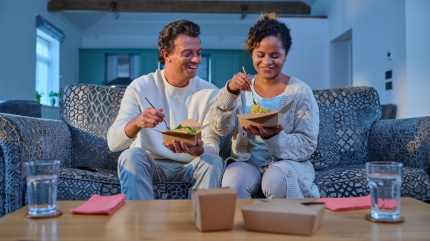
As the UK prepares for New Year’s Eve celebrations, fresh data reveals a widespread push for reducing plastic waste.
A survey of over 2,000 adults, commissioned by Cambridge-based materials innovation company Xampla, highlights that two-thirds of Brits believe takeaway outlets should go plastic-free by next Christmas.

Discover B2B Marketing That Performs
Combine business intelligence and editorial excellence to reach engaged professionals across 36 leading media platforms.
The findings underscore a broader concern, with 7 in 10 people stating that the Christmas season generates excessive plastic waste. Many also call for supermarkets to adopt plastic-free packaging for festive foods.
Alexandra French, CEO of Xampla, explained the urgency of tackling hidden plastics often overlooked by consumers:
“Consumers often aren’t aware of hidden plastics, like those which line takeaway boxes. They’re essentially invisible but they contribute to the mountain of plastic waste polluting our soils and seas, and even stop cardboard being recycled.”
French emphasised the role of Xampla’s Morro™ Coating, a plant-based alternative designed to replace plastic linings in food service packaging. Unlike conventional coatings, Morro™ allows consumers to recycle lined cardboard boxes alongside regular paper waste.

US Tariffs are shifting - will you react or anticipate?
Don’t let policy changes catch you off guard. Stay proactive with real-time data and expert analysis.
By GlobalData“Our focus is on replacing the most polluting plastics, the plastics that cannot be recycled,” French added.
Hidden plastics in takeaway packaging
Plastic-lined takeaway boxes, which are often perceived as eco-friendly due to their paper or cardboard appearance, are a significant obstacle to recycling efforts. These linings prevent moisture and grease from leaking but render the packaging unrecyclable.
Xampla’s survey findings suggest that consumers are increasingly aware of this issue, with many expressing a willingness to adopt more sustainable habits. Two in five respondents plan to make a personal resolution to use less plastic in 2025.
Sian Sutherland, Co-Founder of A Plastic Planet, called for systemic change:
“How many of us will be looking at our overflowing bins filled with plastic packaging, feeling that pang of guilt? The vast majority of it will not be recycled into anything useful; it will end up in an incinerator, export truck, or dumped somewhere to infect our planet for centuries.”
Sutherland highlighted the need for stronger government intervention, noting that countries like the US have already taken decisive steps.
A call for action by 2025
The food service sector is poised to undergo significant changes by 2025, a year many brands previously identified as a target for reducing single-use plastics.
Xampla projects that its Morro™ Coating could replace up to 25,000 tonnes of plastic coatings by the end of the decade.
French stressed the importance of industry responsibility: “In 2025, food service and takeaway brands have a responsibility to replace these hidden and harmful plastics.”
With festive waste exceeding 125,000 tonnes of plastic this year, the urgency for sustainable solutions has never been greater.
Consumers, brands, and governments alike face mounting pressure to address the environmental impact of plastic packaging, ensuring a future that prioritises circular innovation over disposable convenience.





